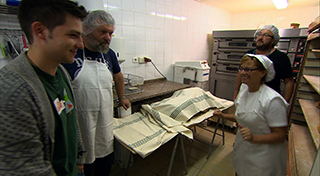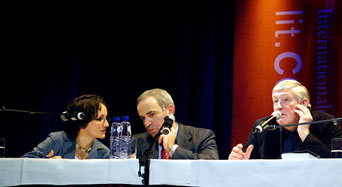5.1 What is interpreting about?
Interpreting is the spoken mediation of a message delivered by a speaker of one language to a listener who does not understand that language. Interpreting takes place in a range of contexts (such as daily community life, international conferences, business meetings and courts) using a variety of modalities (such as simultaneous, consecutive, whispering and liaison interpreting). In addition to having an excellent command of both languages, the interpreter must have a number of other professional, technical and interpersonal skills, and must adhere to a strict code of professional ethics.
Activity 36
In the following extract from the television series Bakeation, Dave and Si (the ‘Hairy Bikers’) are questioning a Spanish baker about her methods, helped by an ad hoc interpreter who tries to translate a Spanish saying. Despite the Hairy Bikers’ best efforts to understand both parties, they finally resign themselves to the communication breakdown and move on. Watch the video and answer the questions below.

Transcript: The missing word
[whispering]
[Caption: so that its own heat finishes the cooking from within. We must keep the bread covered … ]
[Caption: when it comes out of the oven]
[Caption: because in Asturias we have a saying that goes …]
[Caption: … ‘bread and babies will be cold even in August’.]
1 At which point did the communication breakdown occur?
Answer
The communication breakdown occurred when the interpreter tried (and failed) to translate an idiomatic Spanish saying.
2 What caused the communication breakdown?
Answer
The interpreter clearly omits a word when he says ‘must be keep’. If you speak Spanish, you can see that he should have said, ‘Children and bread must both be kept covered’. Instead, he says ‘must be keep’, which does not make sense in this context.
3 How did Hairy Biker Si try to help?
Answer
By indicating through his behaviour that the interpreter has got his full attention, using words like ‘yes’ and ‘OK’; repeating sentences and trying to guess or supply the missing information.
4 What did Dave and Si do when they finally gave up on trying to understand
Answer
Si puts his arm round the interpreter’s shoulders (a friendly gesture expressing support), and Dave puts an end to an embarrassing situation by moving swiftly on to the next task (a face-saving strategy).
In a friendly environment, people will normally do their best to understand each other by using a range of strategies. However, when a professional interpreter is present, the idea is to allow communication to flow naturally as if both parties were using the same language. A good interpreter is inconspicuous and should be ‘invisible’ in the sense that the two parties feel that they are communicating directly with each other without an intermediary.

